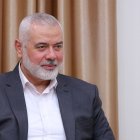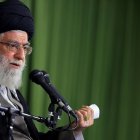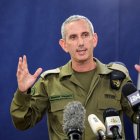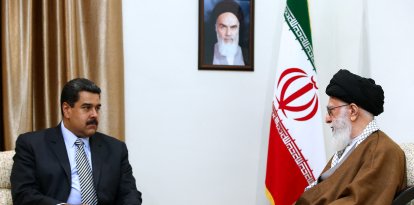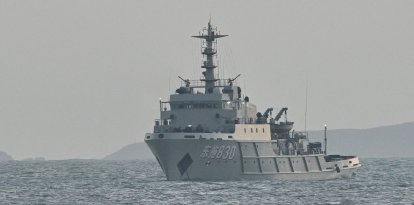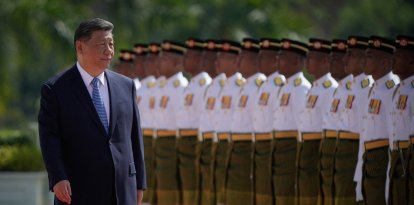Two cheers for the Mossad
Israel's intelligence is at the forefront of the world and enables it to respond to threats to the Jewish state

David Barnea, director of the Mossad, next to Netanyahu.
Since 1967, Israel's strategic and military orientation gradually marginalized the option of preemptive strikes, and anticipation gave way to a defensive concept that essentially relied on the ability to discover what the enemy was up to, rely on warning signs and be able to react in time.
This system, as is logical, placed the emphasis on good -- excellent -- intelligence, both via external, internal and military channels. And this system, as we know, dramatically blew up on Oct. 7, when Hamas, against all expectations from Israel, launched an invasion on Israeli soil in a spree of blood, barbarism and destruction. There are still many today who wonder how such a failure of intelligence was possible, unable to correctly interpret the signals coming out of Gaza and prevent such a large-scale attack. As in the U.S. with Al Qaeda on 9/11, I imagine that part of the responsibility lies in groupthink, lack of imagination and bureaucratic reluctance to confront disruptive options.
It should be remembered that after the tragic surprise of the Yom Kippur war in 1973, Israel instituted profound changes in order to avoid further surprises. There was, for example, the creation of a unit of "devil's advocate" intelligence, charged with challenging commonly accepted assumptions, scenarios and ideas. Likewise, different organizations were empowered to avoid an intelligence monopoly based on the idea that with more eyes, less would escape or go unnoticed.
But as we also know after Oct. 7, when you cry wolf many times, people stop paying attention. And intelligence had taken the devil's advocate approach as just another quip, not as an element to keep paying real attention to. Likewise, the fact that all the agencies involved in intelligence on Hamas thought the same thing did not set off any alarm bells; quite the contrary. But we well know that when all the generals think the same, there is a problem.
Oct. 7 was, therefore, much more than a blow to Israeli society and the institutions charged with defending it. It was a torpedo to Israel's waterline, to the idea of an infallible Israel in its intelligence operations and to the idea of an invincible Israel. And that is what it is fighting against not only in Gaza, but in the north against Hezbollah, in Syria against Iranian militias, in Yemen against the Houthis (who have agreed to sacrifice their own country for the sake of Tehran's expansionist strategy) and also against the Iranian regime that threatens the very existence of the Jewish state.
It is in this context of existential questioning that the work and successes achieved by the whole of Israeli intelligence, from the Aman (military intelligence) to the Mossad (external intelligence), passing through the Shabak (internal intelligence), must be understood and appreciated.
Since the beginning of the war launched by Hamas last Oct. 7, four operations are worthy of note. The first was the elimination of the Iranian leader, head of the Quds Force of the Revolutionary Guard Corps. and head of the Iranian force in Lebanon, Mohamed Reza Zahedi. On April 1 of this year, Reza Zahedi was meeting in Damascus with other Iranian and Syrian military leaders when a missile struck the building attached to the consulate where they were meeting, killing seven of them, including Zahedi himself. Given the extraordinary self-protection measures taken by the Revolutionary Guard Corps. commanders since the American attack on their leader Qasem Soleimani, the location and responsiveness was a clear example of the capabilities of Israeli intelligence.
The second operation was an unusual bombing by IDF aircraft in the Al-Mawasi area, southwest of Gaza, whose target was none other than Hamas' supreme military commander, the organization's No. 2 after Sinwar in Gaza, on July 13. After a few days of analysis of the bombing, Deif was officially declared dead. There is not much data on the operation beyond the fact that it was carried out by the Israeli Air Force, but it can be thought that the location of the Hamas military leader was possible thanks to the work of the internal security services, the Shabak. In a scenario where, for example, locating the whereabouts of Israeli hostages at the hands of Palestinians in Gaza has proven to be very complex, the ability to bomb a leader who spent most of his time holed up in Hamas tunnels and hiding among refugees and in areas designated by Israel as safe could only be celebrated as an Israeli intelligence success. The masterminds of the Oct. 7 massacre know that their days are numbered.
The third, more recent, was the elimination of Fuad Shukr, right-hand man of Hezbollah leader Nasrallah. The United States had deemed him responsible for the attack on its forces in Lebanon resulting in the death of 241 Marines in 1983. Shukr was also held responsible for authorizing the rocket attack that hit a soccer field in the Druze-Israeli town of Majdal Shams, killing 12 children. According to IDF spokesman Admiral Daniel Hagari, the operation was made possible thanks to the findings of military intelligence who identified and located Shukr in a house inside the Shiite neighborhood of Dahiyeh, south of Beirut. Likewise, taking into account the personal and local self-protection measures of the Hezbollah leaders, one can only agree with the words of the Israeli Defense Minister Yoav Gallant, who stated after the attack on Tuesday: "Tonight, we have shown that the blood of our people has a price, and that there is no place out of reach for our forces to this end."
Finally, just today, July 31, it became known that the leader of Hamas in the golden exile of Qatar, Ismail Haniyeh, was eliminated during a visit to Iran on the occasion of the inauguration of the new Iranian president. A missile entered through the window frame of the room where he was staying with lethal precision. As the man responsible for relations between Hamas and Iran, his death is a serious blow to Tehran's plans. Moreover, Israel being able to take advantage of his visit to Iran is a clear message, not only to Hamas leaders, but to the Iranian regime itself, that they should be alarmed and frightened by Israel's intelligence capabilities. As Prime Minister Netanyahu stated, "To our enemies, I say: Do not underestimate us."
War is not only, as Klausewitz said, the continuation of politics by other means, but is an activity that already transcends the traditional "battlefield." Intelligence operations are an integral part of this expanded warfront. And everything seems to point to Israel remaining at the forefront in this sphere.





